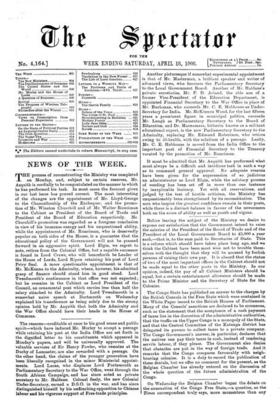NEWS OF THE WEEK.
THE process of reconstructing the Ministry was completed on Monday, and, subject to certain reserves, Mr. Asquith is cordially to be congratulated on the manner in which he has performed his task. In most cases the forecast given in our last issue has proved correct. The most interesting of the changes are the appointment of Mr. Lloyd-George to the Chancellorship of the Exchequer, and the promo- tion of Mr. Winston Churchill and of Mr. Walter Runcirnan to the Cabinet as President of the Board of Trade and President of the Board of Education respectively. Mr. Churchill's promotion was regarded as a foregone conclusion in view of his immense energy and his unquestioned ability, while the appointment of Mr. Runciman, who is deservedly popular on both sides of the House, is a guarantee that the educational policy of the Government will not be pressed forward in an aggressive spirit. Lord Elgin, we regret to note, retires from the Colonial Office, but a capable successor is found in Lord Crewe, who will henceforth be Leader of the House of Lords, Lord Ripon retaining his post of Lord Privy Seal. A more questionable appointment is that of Mr. McKenna to the Admiralty, where, however, his admitted grasp of finance should stand him in good stead. Lord Tweedmouth's continuance in that office was not expected; but he remains in the Cabinet as Lord President of the Council, an ornamental post which carries less than half the salary attached to the Admiralty. Lord Tweedmouth in a somewhat naive speech at Dartmouth on Wednesday explained his transference as being solely due to the strong opinion held by Mr. Asquith that both the Admiralty and the War Office should have their heads in the House of Commons.






































